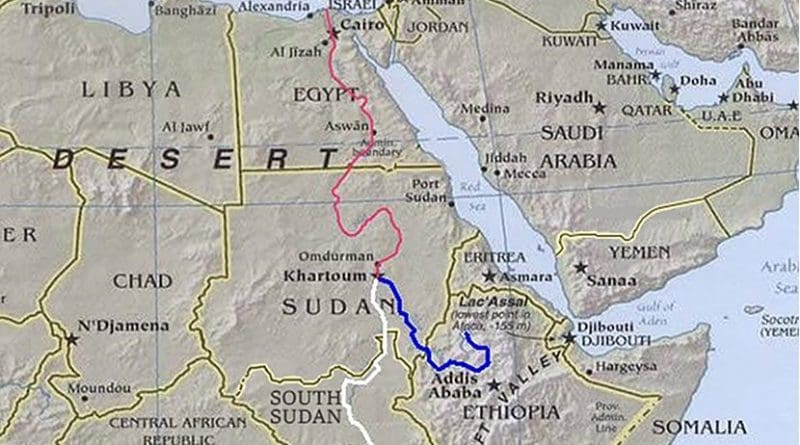Egypt Races To Reduce Impact Of $5 Billion Ethiopian Dam
By Arab News
By Mohamed El Shamma
An international research group has warned of “dire humanitarian consequences” if a controversial Ethiopian project to dam the Nile leads to conflict with Egypt and neighboring Sudan.
The $5 billion dam is a source of friction between the three countries that could spill over into open hostility, the Brussels-based International Crisis Group said in a report.
Egypt and Sudan fear the dam, now being built near the Sudanese border, could reduce available water to both countries.
The Grand Ethiopian Renaissance Dam, or Al-Nahda dam, has been under construction since 2011 and is due to be completed in 2022. When finished it will be the largest dam in Africa, generating about 6,000 megawatts of electricity for domestic use and export.
Dr. Abbas Al-Sharaki, a water resources expert at the Institute of African Studies at Cairo University, told Arab News that Egypt is likely to face a water crisis in the future because of the dam.
Planned negotiations on the dam between the leaders of Egypt and Ethiopia are unlikely to succeed, he said.
Ethiopia plans to store 74 billion cubic meters of Nile water behind the dam, which would affect the 55.5 billion cubic meters of water that Egypt currently gets from the Nile. Ethiopia’s leaders insist the dam will also benefit all three countries.
Dr. Mahmoud Abu Zeid, the former Egyptian minister of irrigation, said that the impact of the Ethiopian dam on the Egyptian water quota is inevitable, but Egypt is looking to reduce its effects and delay it as long as possible until other resources are raised.
Dr. Hisham Bakhit, professor of water resources at Cairo University, said that Egypt is conducting large-scale research to reduce the impact of the dam.
Egypt has many sustainable solutions to manage the Nile’s water, he said.
The country gets 90 percent of its irrigation and drinking water from the Nile, and has “historical rights” over the river guaranteed under treaties in 1929 and 1959, Bakhit said.
MP Mustafa Al-Jundi said that Egypt has the right to appeal to the African Union, the African Parliament, the UN and international courts in the case of Ethiopia’s intransigence.
Mohamed Abdel-Ati, Egypt’s minister of irrigation and water resources, said this week that Cairo does not oppose the development ambitions of any country “as long as they don’t harm any shares in water or threaten national security.”
The ministry is working to tap all sources of water and implement modern methods in irrigation. Desalination and wastewater treatment plants, and experimental studies into salt water farming are among Egypt’s plans to ensure reliable future supplies, he said.
The Al-Nahda dam was 60 percent complete before work stopped in August as a result of a funding crisis. In January, a Chinese company, Voith Hydro Shanghai, signed a deal to build the turbine generators at the dam.

